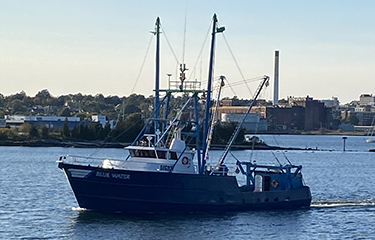New Bedford, Massachusetts, U.S.A.-based Blue Harvest Fisheries is defending its business practices amid pressure about the fisheries’ legal structure, and signs of a potential antitrust probe by the U.S. Department of Justice.
The concerns were kicked off in July 2022 by a story published in ProPublica via a partnership with The New Bedford Light highlighting the growing influence of foreign equity in U.S. fishing interests as a result of changes to federal rules adopted in 2010.
The new framework created permits based on catch history, and granted fishermen the right to either fish, sell, or lease access to quota. The ProPublica story detailed how that system has shifted the landscape of fishing interests in New Bedford and led to accelerated consolidation of the fishing industry. The story also highlighted Blue Harvest, and how it was purchased by Bregal Partners, an arm of a firm owned by a Dutch billionaire family.
According to the story, consolidation in the industry has led to deteriorating working conditions for many local fishermen, with the number of people working in the industry in New Bedford dropping even as the amount of hours the average fisherman worked increased.
The ProPublica story led to three U.S. senators - U.S. Sen. Richard Blumenthal (D-Connecticut) and both U.S. senators representing Massachusetts, Elizabeth Warren and Ed Markey - criticizing what they called lax rules and weak oversight of the fishing industry.
“Predatory private equity billionaires have bought into nearly every sector of the economy, generating huge profits for insiders while leaving workers out in the cold,” Warren said, according to a follow-up report by ProPublica in July. “I’m deeply concerned by this report regarding the lack of federal oversight of foreign ownership limits and that some hardworking fishermen in New Bedford are not being treated fairly.”
Blue Harvest was spotlighted by both stories. The company owns the largest share of the quota in the New England groundfish fishery, with rights to catch 12 percent of the total allowable catch. However, ProPublica’s report claimed the 2010 rule-change allowed it to lease additional fishing quota, while at the same time making it more difficult to track which company is actually doing the fishing, allowing Blue Harvest to essentially circumvent antitrust caps. By law, no company can own more than 15.5 percent of the total allowable catch at any given time.
On 7 October, ProPublica and The New Bedford Light reported the U.S. Department of Justice (DOJ) may be investigating whether there are possible antitrust issues in the New England Fishing industry. According to the report, representatives of fishing groups have been interviewed by two DOJ lawyers regarding the state of the fishery.
“We focused on how this level of consolidation is a regulatory failure,” Massachusetts Seafood Collaborative Executive Director Mark DeCristoforo, who was interviewed by the DOJ, told ProPublica and The New Bedford Light.
In a statement, Blue Harvest said it complies with all federal regulations, including rules on fleet consolidation and foreign investment.
“Blue Harvest Fisheries actively manages its quota and follows all federal regulations. This includes limits on the amount of quota that we are able to own, and keeps us below the caps set by law,” Blue Harvest said in a release. “The sector system is designed to allow the amount of quota leased among members within sectors at any given time to fluctuate, mirroring the natural fluctuations and availability of different species in a multispecies fishery.”
According to Blue Harvest, its practice of leasing quota is not in any way an attempt to circumvent antitrust ownership limits, as the reports implied. Instead, the company said, it is a way to give the company additional flexibility to target abundant species, and allows the boats to remain active instead of shutting down due to a lack of quota.
“This kind of leasing is what saved the economic opportunity of the fishery when active participation was impossible for many fishermen during the extreme reduction of biomass and quotas in the 1990s and early 2000s,” the company said.
Blue Harvest said it does not own enough quota to raise any antitrust issues, but that the fishery and company must pursue efficiencies to withstand competition from imported seafood.
“In addition to the limits placed on ownership to encourage domestic competition, the overwhelming majority of U.S. seafood is imported, subjecting groundfish prices to the pressures of international market forces,” the company said. “We compete not just with local supply, but also directly with supply from countries like Iceland and Norway.”
Blue Harvest also corrected an assertion made in the ProPublica piece that the company was one of those supporting a push to move scallop access to a leasing system similar to that used for the groundfish fishery. That push was defeated in a vote by the New England Fishery Management Council in late September 2022.
“Blue Harvest Fisheries did not support the measure, and has played no part in the debate over the measure,” the company said. “The company is currently in the process of divesting itself from its stake in the scallop fishery in order to focus more on groundfish.”
Photo courtesy of Blue Harvest







